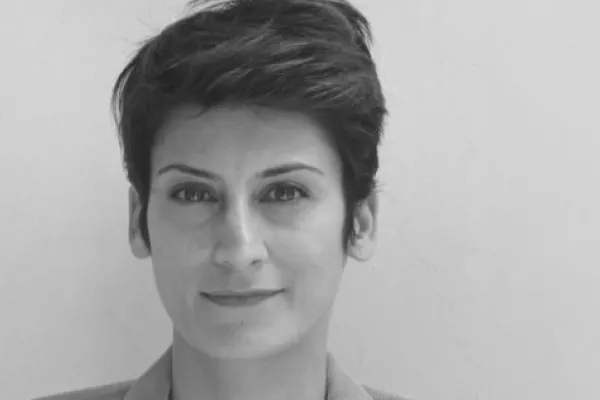Smith Medalist Sarah Belal: Advocating for the Voiceless and Vulnerable
Alum News
Attorney and human rights advocate Sarah Belal ’01 will be celebrated on Rally Day.
Published February 12, 2024
Attorney and human rights advocate Sarah Belal ’01 says helping to free people incarcerated in “the darkest corners of the world” has been a lesson in “resilience and triumph over adversity.”
The founder and executive director of Justice Project Pakistan, Belal has been an advocate for vulnerable and voiceless prisoners in Pakistan and abroad. She is one of four remarkable alums who will be awarded the 2024 Smith College Medal at Rally Day on Thursday, Feb. 22, in John M. Greene Hall beginning at 1:30 p.m. EST. The event will be livestreamed on Smith’s Facebook page.
Members of the Smith community are also encouraged to participate in this year’s fundraising challenge for financial aid. Specifically, throughout the month of February the board of trustees is matching dollar for dollar all gifts up to $500,000.
Under Belal’s leadership, Justice Project Pakistan secured the release of more than 40 Pakistani detainees from Bagram in Afghanistan in 2014, as well as stays of execution of several death row prisoners in Pakistan. As a result of the organization’s advocacy efforts, the Supreme Court of Pakistan issued a landmark judgment in 2021 prohibiting the execution of prisoners with severe mental illness.
Here, Belal talks about the ongoing work of her organization, the influence of her Smith education and her hopes for the future.
What would you say is your proudest accomplishment?
“My proudest accomplishment undoubtedly stems from founding Justice Project Pakistan. This organization has been instrumental in defending the most vulnerable Pakistani prisoners facing severe punishments, both at home and abroad. Beyond providing legal representation, our mission has been to inspire and train the next generation of human rights lawyers, advocating for a more equitable legal practice in Pakistan.
“Through our strategic litigation, advocacy, and communications efforts, we've achieved significant milestones. Notably, our work has contributed to the cessation of executions in Pakistan for over three years, alongside the introduction of policies to halt executions. We've also played a pivotal role in the criminalization of torture and secured landmark Supreme Court judgments preventing the execution of mentally ill prisoners and juveniles, as well as securing the repatriation of 41 Pakistani prisoners from U.S. detention in Bagram.
“At the core of JPP's mission lies a profound commitment to the individuals incarcerated in the darkest corners of our world. Throughout our journey, advocating for these vulnerable and voiceless prisoners, we've faced heartbreaking losses, yet nothing compares to the joy of witnessing our clients reunite with their families.”
What Smith lesson continues to affect your life today?
“The most profound gift bestowed upon me by Smith College is the experience of inhabiting a world where women's presence and significance are central to everyday existence. This experience has become deeply ingrained in my soul, compelling me to strive for a future where women are treated as equals in all spheres of life. Once one has experienced the essence of true equality, it becomes an indelible part of one's being. Consequently, the pursuit of equality across every facet of a woman's life becomes instinctive and a natural extension of one's identity. This commitment ripples outward, inspiring and empowering other women who witness someone like myself navigating the world as a woman who is truly free.”
What advice do you have for Smithies who are graduating this year?
“Firstly, in a world where challenges may seem daunting and injustices rampant, I urge them never to lose hope and never give up. Armed with the exceptional education and experience gained from attending a college that prioritizes their needs, Smith women are uniquely positioned to lead authentically. However, cultivating resilience and humility are paramount, as these qualities not only bolster individual strength but also serve as powerful tools for advancing the status of women in society.
Secondly, I encourage them to guard the feeling of being valued and prioritized, which may often be undermined in the world beyond Smith. In a society that too often attempts to silence women, it's crucial to protect one's sense of worth and significance. In moments when the world may attempt to gaslight you into doubt or silence, remember that your experience and your voice matters profoundly. ”
What does being honored with the Smith Medal mean to you?
“Smith College has been one of the most transformative experiences of my life. From the rich diversity of notable alums, to the vibrant community of diverse women and the exceptional faculty who have inspired and educated me, Smith holds a special place in my heart. To be recognized by this institution is truly humbling. It reaffirms my commitment to my work with a renewed sense of purpose. Knowing that my alma mater acknowledges and supports my journey, both as a dedicated advocate for my clients and as a woman navigating daily battles for equality, fills me with gratitude and a profound sense of solidarity. This honor serves as a reminder that I am not alone in my endeavors and that my efforts to advocate for justice resonate within the supportive embrace of the Smith community.”
What key issues would you like to see Smithies tackling today?
“I believe it's crucial for Smithies to prioritize amplifying and centering the voices of women of color and those from minority communities. Embracing intersectional feminism is paramount, as it reminds us that women’s issues intersect with every aspect of life. As a U.S. citizen, a woman of color, and an international alumna, I've experienced firsthand how my journey toward self-actualization is intertwined with various sociopolitical and cultural factors. To truly express solidarity, we must actively listen to those who may offer uncomfortable truths. By addressing issues of race, ethnicity, gender and other intersecting identities, Smithies can contribute to creating a more inclusive and equitable society where all women can thrive.”
